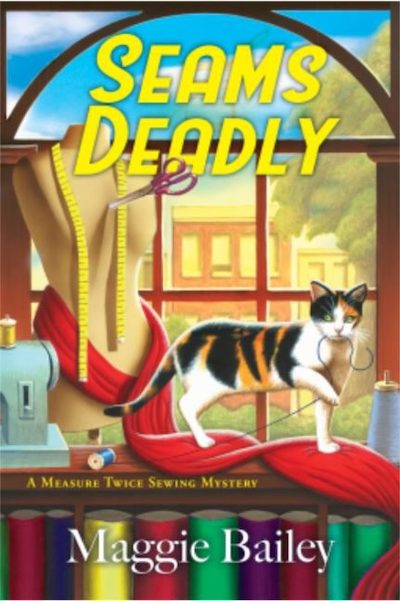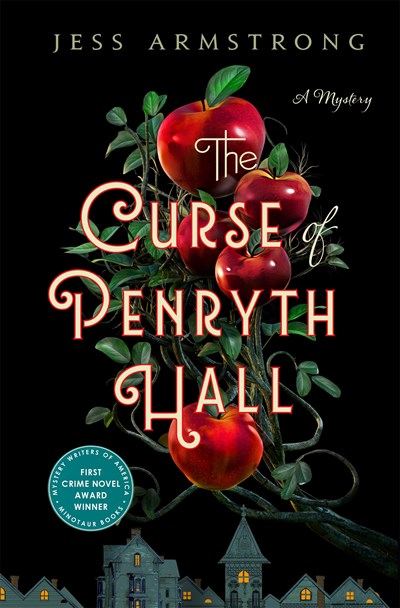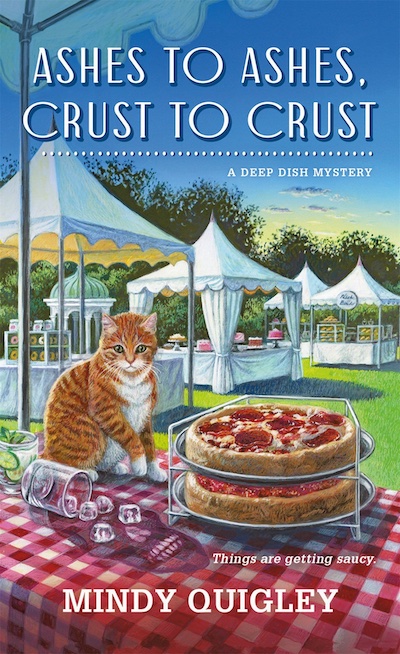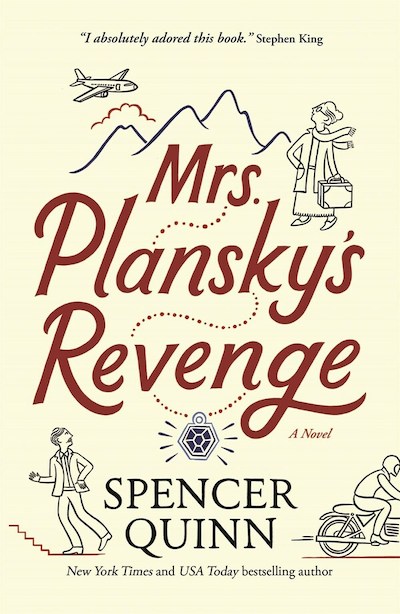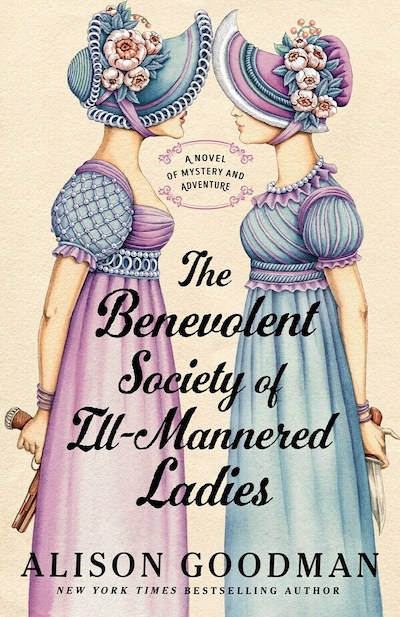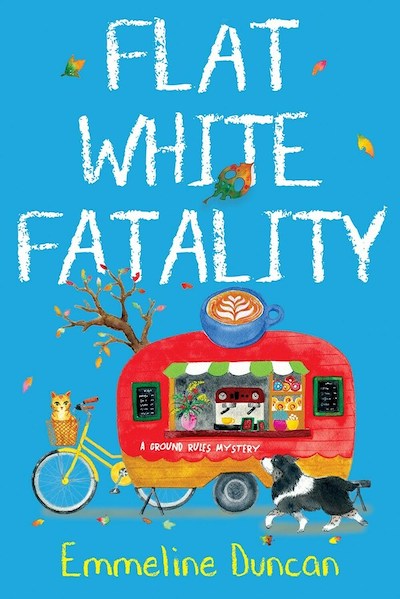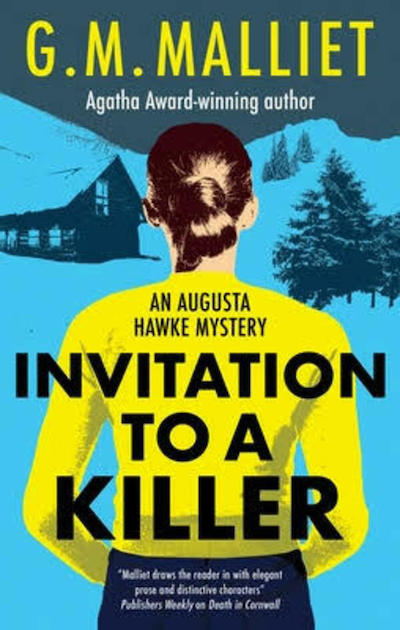True confession: I can’t sew. Not to even to hem a pair of pants. But that hardly stopped me from enjoying Seams Deadly. After discovering her teaching assistant in bed with her boorish, snobbish husband—cheap, too, if he won’t rent a hotel room—middle-school teacher Lydia Barnes ups and moves from Atlanta to the mountain town of Peridot, Georgia. It’s very Mayberry RFD, with friendships and gossip galore. Lydia connects with her fellow sewists—in fact, she gets a job at the Measure Twice fabric store—and before you can say “zigzag stitch,” she’s set up on a date with her handsome neighbor and the town’s bookseller, Brandon Ivey. It’s one weird date, and Lydia’s comedic voice comes to the fore as she narrates the evening. But weird only gets weirder as later that night, she comes across Brandon dead as can be, with a pair of dress shears lodged deep into his neck. Ouch! Newcomer Lydia is the police’s number one suspect, and when another body is found, the cops are ready to lock her up. Lydia turns to the sewists to help get her out of this mess. If only it were that simple. Special mention goes to Baby Lobster, Lydia’s cat, for valor extraordinaire.
Women Sleuths
Devil-may-care heiress Ruby Vaughn has just sent the latest of her boss’s housekeepers running, with the woman on the way out muttering something about “a den of sin and vice.” Ruby does like to knock back a few drinks and scarcely cares about propriety, having planned, while a nurse during the Great War, to set up home with her fellow nurse and lover, Tamsyn. When that antiquarian-bookseller boss announces, “I’ve been thinking,” Ruby knows it doesn’t usually bode well, but this time there’s an upside. The trip he wants her to undertake, delivering mysterious books to a Ruan Kivell in Cornwall, brings her back in contact with Tamsyn, now Lady Chenoweth. Penryth Hall, Tamsyn’s miserable home with her abusive husband, only makes Ruby long all the more for the life she could have had with Tamsyn. When awful Lord Chenoweth is found dead, his body slashed as though by animals, the area’s depths of superstition and past misdeeds begin to reveal themselves, as do the powers of Ruan, the local Pellar, a powerful folk healer. Ruby refuses to believe in the curse that the locals say Chenoweth perished from, pursuing instead the help of the fledgling science of forensics to figure out what happened and restore Tamsyn’s happiness. This debut won the Mystery Writers of America/Minotaur First Crime Novel Competition, a well-deserved honor for a book whose gutsy main character and immersive world-building will remind readers of Margaret Dove in Evie Hawtrey’s And By Fire.
First things first: Quigley’s sophomore effort is every bit as witty, character-driven, and well-plotted as last year’s Six Feet Deep Dish. As always, Geneva Bay, Wisconsin chef and pizzeria owner Delilah O’Leary has a few too many things going on. She’s hoping to win the “Taste of Wisconsin” culinary contest, but can’t quite get the recipe exactly right. Her BFF and sous chef, Sonya, is having an affair with none other than the wife of a celebrity chef. And as luck would have it, he’s the judge for the competition. Bad timing! Meanwhile, her pit bull of a great-aunt is suddenly throwing a lot of shade her way. With no explanations. Even Butterball, the cat she shares with her ex-fiancé, wants out. But when visiting the new juice bar—owned by her ex’s annoying girlfriend—she witnesses one of the customers keel over, likely dead from a poisoned smoothie. And before you can say Pretzel Crust Deep-Dish Bratwurst Pizza, Delilah is drawn into some very risky goings-on. The satire is a joy, Delilah’s narration is sheer pleasure, and her restaurant crew provides plenty of balance. This is turning out to be one of the best new cozy series going.
Edgar Award-winning Hirahara’s first novel in this series, Clark and Division, was a New York Times Best Mystery Novel of 2021, among many other accolades; this follow-up will please fans with more thoughtful, poignant, and historically accurate investigations of Japanese American life after World War II.
After leaving the Manzanar camp in the first book and moving to Chicago, nurse’s aide Aki Nakasone and her parents have returned to California, where they prospered before being imprisoned, and where her father and others desperately hope to reclaim their land and businesses. Aki’s husband, Art, gets work at the Rafu Shimponewspaper (where Hirahara has worked), but his after-work drinking with other journalists leaves Aki feeling she saw more of him when he was in the army. She’s distant from her parents, too, despite sharing their home, with Hirahara portraying the generational difference as part of the estrangement that is the central theme of the book. Her characters raised in the camps display a kinship that transcends other bonds and leaves them markedly and painfully adrift from their parents.
When Art’s army buddy Babe goes missing after his father’s battered body is found, Aki sets out to find Babe and restore balance to her own unsettled life. This quest sees her explore elements of postwar life such as the competition between returning Japanese and Black Americans for housing and the effects of “shell shock” (PTSD) on a community. A must-read.
Just try not to fall in love with Loretta Plansky, the plucky, 70ish hero of this sweet, feel-good mystery. A widow—she regularly chats with her deceased husband, Norm—Loretta keeps busy in Florida with friends, family, and a mean game of tennis. She and Norm invented the Plansky Toaster Knife, which toasts as you slice—is that that genius or what?—and they managed to accumulate quite the nest egg. Which is helpful, since Loretta’s kids seem to be forever circling, seeking investments and loans for their hair-brained schemes. So when her grandson Will calls from college, and needs to be bailed out because of a DUI, it’s Loretta to the rescue—or at least Loretta’s bank account. Of course, the caller wasn’t Will, and the normally savvy Loretta wakes the next morning to find herself divested of savings, investments, and worse of all, her self-respect. After reviewing her finances and discovering that to get by, she’d need to do the unthinkable and move her 96-year-old father in with her, Loretta makes the shocking decision to head off, track down the thieves, and recoup her funds. This second part of the novel is a real delight. Yes, there is quite a bit of coincidence and luck, but there’s also a wild cast of characters, some surprising relationships, and real evolution on Loretta’s part. For fans of Simon Brett’s Feathering novels and Richard Osman’s Thursday Murder Club series
An absolute delight, wonderfully written and with enough plot to keep the reader zooming through the book then quickly asking for more. Regency London is the setting and the twin Colebrook sisters, Lady Augusta (Gus) and Lady Julia, are our amateur detectives. Unusual for women of this period, they were left with personal incomes by their late father, allowing them independence and the ability to thumb their noses at their useless younger brother. In their early forties and unmarried, the two can’t bear the injustices they see heaped on the women around them, and Gus is determined to do something. When word reaches them that a friend’s goddaughter has been locked away by her husband with the intent to kill her—as she’s unable to have children—the sisters head off to spring her from her country house. Along the way, they pair up with an old interest of Gus’s, Lord Evan Belford, back from exile in Australia—it’s a long story—and hotter than ever. What’s unusually successful about this book is that instead of focusing on one case, the sisters take on a series, including one case in which Gus, disguised as a man, infiltrates a brothel. While their identities as detectives grow, several themes emerge, including Julia’s struggle with breast cancer, their need to surrender their home to their brother and his fiancé, and, of course, what to do with Lord Belford. The Regency era, feminism, and romance all work together to create a book that will delight many. And how about that cover?
Hella Mauzer, 29, is both very much of Finland—she’s a dour private investigator who seems made from her country’s six-months of darkness —but completely not what her fellow 1950s Finns want her to be. Put flowers under your pillow on midsummer night and you’ll dream of your future fiancé, they hint, with marriage and motherhood then all but guaranteed. Hella wants none of it. She keeps both her ex-boyfriend, who can’t grasp that things are over, and her new, interested neighbor at arm’s length while immersed in two investigations. One is a favor to her father’s former secret-police colleague: a background check on the prospective head of Helsinki’s homicide squad. The other is more personal. Hella is desperate to find out who killed her parents, sister, and nephew, all of whom died when hit by a truck when Hella was a teen. Getting the courage to read the police file on her family’s deaths is a big step, and one that immediately leads her to suspect that there was much more to the tragedy than an accident. The background check is far from straightforward either, adding up to a tale that brings to mind Game of Thrones, with all that story’s evil and power-hungry machinations. If Scandinavian mysteries are your thing, try this, as well as Ann-Helén Laestadius’s Stolen, and Joachim B. Schmidt’s Kalman for great stories that take place outside the more common urban settings in Sweden and Denmark.
While I love an old-fashioned cozy as much as anyone—the guest everyone loathes is found dead on the library floor, a fatal slash across a carotid artery, or perhaps a touch too much monkshood in the afternoon tea?—I especially enjoy mysteries located in the present, with settings and characters that are fresh and idiosyncratic. This Portland (OR) based series, Ground Rules, fits the bill perfectly. In the first volume, barista and total hipster Sage Caplin just opens her new coffee cart when, as luck would have it, a corpse is found dead by her wheels. In Double Shot Death, the coffee cart is at a sustainable music festival—how PDX is that?—when a body is found in the woods clutching one of her coffee mugs. In Flat White Fatality, Sage has a side gig modeling as a character for her boyfriend’s game development company, Grumpy Sasquatch Studio. But then, during a team-building event, the most annoying of the company’s coders is murdered, in Sage’s own roastery no less. When another employee is almost killed, Sage realizes she needs to step it up and find the murderer before she becomes suspect number one. Plenty of satire, lots of fascinating local detail, excellent friends and family, and an insider look at the world of special coffees.
A particular type of horror needs nothing supernatural: It’s when a mundane task suddenly requires every ounce of will and wits to survive. Police officer Elise Sutton is shopping for towels—her kids have been hinting that the threadbare affairs they’ve been using are not the world’s only towels, but who has the time?—when her training kicks into gear: there’s a shooter in the store. The scene that unfolds is a highlight of the book, though far from the only tense moment, and a meticulous portrait of human nature under pressure. Elise gets the gunman in her sight as he takes aim at a tall man who then escapes; the gunman is killed by Elise and the clothing racks come alive with shoppers who were hiding, terrified. Elise must now deal with her own trauma, having killed a man, and with the doubt that plagues her: did she need to kill him? Just as readers settle in for a tale about survivor’s guilt and PTSD, the story takes a turn: the tall man shows up, way too grateful for being saved, and by the time Elise realizes that he’s acting oddly, he’s become her obsessed stalker. Alternating with this inward-focused tale of one woman’s turmoil and peril is the saga of a burned body that’s found in the Connecticut woods, in an oven used by hunters. Finding out how these stories are related, and whether Elise’s marriage and career can survive the terror she faces, makes the pages turn quickly. Ideal for those who enjoyed Ian McEwan’s Enduring Love, another tale of obsession.
Love a good locked-room mystery? Well, here’s a book with two, sort of. Augusta Hawke, crime writer with a developing side gig as an amateur detective, has been invited to a dinner party at the home of Callie Moore, wife of one of Washington, DC’s biggest lobbyists, making Callie herself a sort of demi-goddess. Turns out Callie is eyeing Augusta to ghostwrite her memoirs; in fact, everyone at the dinner has some sort of publishing aspiration. And it’s quite the assemblage, including a congressman and his wife; a CIA couple; and Doc Burke, a famous humanitarian. Augusta may have little interest in ghostwriting, but the menu is delectable, the libations lavish—until the doctor seems to fall asleep. Except you, me, and Augusta all know he’s not sleeping. He’s dead, likely, it turns out, from his heart condition. O.K., it’s not a locked-room mystery if everyone Ubers home, but certainly it has the makings of one. Over the next several months, Augusta researches and ruminates, deciding that indeed the good Doc was murdered, likely poisoned. But how to find the murderer? Augusta decides to host a writers’ retreat, in the Shenandoah Mountain, just for the dinner guests. This crazy/fun plan—yes, it snows abundantly—provides the true locked-room experience. For all who love Augusta’s wit, insights into DC and the publishing industry, and a little bit of Agatha.

